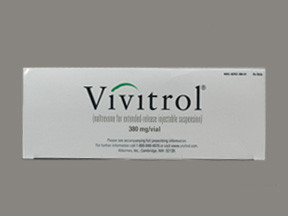NALTREXONE SUSPENSION - INJECTION
PHONETIC PRONUNCIATION: (nal-TREX-own)
COMMON BRAND NAME(S): Vivitrol
GENERIC NAME(S): naltrexone microspheres
Uses
USES: This medication is used to treat alcohol abuse. It is used only in people who have been able to stop drinking for some time before starting treatment with naltrexone. You should not be drinking when you start naltrexone. It can help people drink less alcohol or stop drinking altogether. Naltrexone works in the brain to decrease the desire to drink. It does not work like some other treatments for alcohol abuse (e.g., disulfiram). It will not make you sick when taken with alcohol. This medication is also used to prevent relapse to opioid abuse, after opioid detoxification. It works by blocking the action of opioids. This medication must not be used in people currently taking opiates, including methadone. Doing so can cause sudden withdrawal symptoms. Naltrexone belongs to a class of drugs known as opiate antagonists. It is used as part of a complete treatment program for alcohol or opioid abuse (e.g., counseling, 12-step program, lifestyle changes).
How to use NALTREXONE SUSPENSION - INJECTION
HOW TO USE: Read the Medication Guide provided by your pharmacist before you start using naltrexone and each time you get a refill. If you have any questions, ask your doctor or pharmacist. Before you receive this medication, you should have a urine test to check for recent opiate drug use. Your doctor may give you another medication (naloxone challenge test) to check for opiate use. Do not use alcohol/any opiates for at least 7 days before starting naltrexone. You may need to stop certain opiate drugs (such as methadone) 10 to 14 days before starting naltrexone. This medication is injected into a muscle in the buttock as directed by your doctor, usually once a month. Dosage is based on your medical condition and response to treatment. Your doctor may start you at a lower dose and monitor you for any side effects or withdrawal symptoms before increasing your dose. If you are giving this medication to yourself at home, learn all preparation and usage instructions from your health care professional. The mixed medication is milky white. Before using, check this product visually for particles or discoloration. If either is present, do not use the liquid. Learn how to store and discard medical supplies safely. Do not increase your dose or use this drug more often or for longer than prescribed. Do not stop taking this medication without consulting your doctor. To get the most benefit from this medication, use it regularly and continue your treatment program. To help you remember, mark your calendar with the days you need to receive this drug and/or be treated. Tell your doctor if you start drinking alcohol again or start using drugs.
Side Effects
Precautions
Interactions
Overdose
Images
Reviews
Faq for NALTREXONE SUSPENSION - INJECTION
Naltrexone Suspension - Injection is used to treat opioid dependence and alcohol dependence.
Naltrexone Suspension - Injection works by blocking the effects of opioids and reducing the craving for alcohol.
Common side effects of Naltrexone Suspension - Injection include nausea, headache, dizziness, nervousness, and trouble sleeping. Severe side effects may include liver problems or allergic reactions.
Naltrexone Suspension - Injection is administered by a healthcare professional through an injection into the muscle.
The effects of Naltrexone Suspension - Injection can last up to 72 hours, but it may take longer for the medication to completely leave the system.
No, it is not recommended to drink alcohol while on Naltrexone Suspension - Injection as it can lead to serious side effects and may reduce the effectiveness of the medication.
No, Naltrexone Suspension - Injection is not addictive. It is actually used to treat addiction by blocking the effects of opioids and reducing the craving for alcohol.
Naltrexone Suspension - Injection should only be used during pregnancy if the benefits outweigh the potential risks. It is important to consult with a healthcare professional before using this medication while pregnant.
Naltrexone Suspension - Injection may interact with certain medications, so it is important to inform your healthcare provider about all the medications you are taking. This includes prescription, over-the-counter, and herbal supplements.
Disclaimer
IMPORTANT: HOW TO USE THIS INFORMATION: This is a summary and does NOT have all possible information about this product. This information does not assure that this product is safe, effective, or appropriate for you. This information is not individual medical advice and does not substitute for the advice of your health care professional. Always ask your health care professional for complete information about this product and your specific health needs.

No Reviews Yet